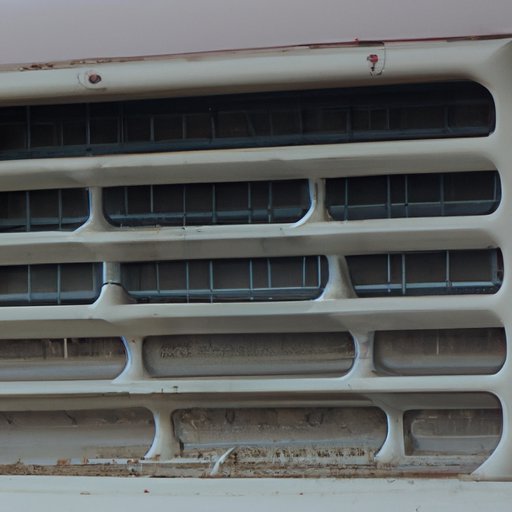Introduction
Air conditioning is a technology that has been around for over a century, yet it is often taken for granted in our day-to-day lives. From the comfort of our homes to the production of goods in factories and warehouses, air conditioning has revolutionized the way we live, work and play. In this article, we explore the history, innovations and impacts of air conditioning, from its early developments to its modern applications.

A Historical Look at the Invention of Air Conditioning
The concept of air conditioning dates back to ancient times, when people used evaporation and other cooling methods to cool their homes. As far back as 1758, Benjamin Franklin and John Hadley experimented with evaporative cooling using ether and alcohol mixtures. In the late 1800s, the first mechanical refrigeration systems were developed, using ammonia and sulfur dioxide as refrigerants. However, these systems were inefficient and expensive.
In 1902, Willis Carrier invented the first modern air conditioning system. He was working for the Buffalo Forge Company, which manufactured industrial fans, and he was tasked with solving a problem for a printing company. The humidity in their facility was causing the ink to smudge on their printed materials. Carrier developed a system that used compressed air to cool and dehumidify the building. This invention marked the start of modern air conditioning.
By 1914, the first commercial air conditioning units had become available, and they quickly became popular in movie theaters, churches and public buildings. By the 1920s, air conditioning had become commonplace in many homes, businesses and institutions. Today, air conditioning is an essential part of modern life.

How Air Conditioning Changed the Way We Live
Air conditioning has had a profound effect on the way we live. In the home, it provides comfort and convenience. Without air conditioning, summer days can be sweltering and uncomfortable. With air conditioning, however, homes can remain cool and comfortable even on the hottest days. Air conditioning has also made it possible for people to work and sleep comfortably during hot weather.
In the workplace, air conditioning has allowed businesses to operate more efficiently. With air conditioning, employees can stay productive in hot conditions, and machines can run without overheating. Air conditioning has also improved safety in some workplaces, such as factories and laboratories, where heat and humidity can be hazardous. Air conditioning has also enabled the expansion of industrial production, allowing factories to operate year-round in hot climates.

Exploring the Inventors and Innovations Behind Air Conditioning
Willis Carrier is widely credited as the inventor of modern air conditioning. Carrier was an engineer who worked for the Buffalo Forge Company, and his invention of air conditioning revolutionized the industry. His system used compressed air to cool and dehumidify buildings, making it much more efficient than previous systems.
Other innovators have made important contributions to the development of air conditioning. Fredrick Jones invented the first mobile air conditioning unit in the 1930s. In the 1950s, Robert Marsh developed the first chlorofluorocarbon (CFC) refrigerant, which was safer and more efficient than previous refrigerants. In the 1960s, James Ritty developed the first computerized air conditioning control system.
The Impact of Air Conditioning on Society and Industry
The invention of air conditioning has had a profound impact on society and industry. In the workplace, air conditioning has increased productivity by allowing employees to work in greater comfort. It has also enabled the expansion of industrial production, allowing factories to operate year-round in hot climates. In addition, air conditioning has improved public health by controlling the spread of airborne diseases.
Examining the Economic and Environmental Impacts of Air Conditioning
The economic benefits of air conditioning are clear. Air conditioning has made it possible for businesses to operate more efficiently, leading to increased profits. Air conditioning has also become more energy-efficient in recent years, resulting in lower energy bills for households and businesses. According to the U.S. Department of Energy, air conditioners consume 6% of all electricity produced in the United States.
However, there are environmental concerns associated with air conditioning. Air conditioners use large amounts of energy, which can lead to air pollution and climate change. Additionally, air conditioners use hydrofluorocarbons (HFCs), which are potent greenhouse gases. To reduce the environmental impact of air conditioning, energy-efficient models should be used whenever possible.
Conclusion
Air conditioning has come a long way since its invention in 1902. From providing comfort and convenience in the home to enabling the expansion of industrial production, air conditioning has revolutionized the way we live, work and play. We have explored the history, innovations and impacts of air conditioning, from its early developments to its modern applications. While air conditioning has many economic and environmental benefits, it is important to remember the environmental concerns associated with its use.
(Note: Is this article not meeting your expectations? Do you have knowledge or insights to share? Unlock new opportunities and expand your reach by joining our authors team. Click Registration to join us and share your expertise with our readers.)
